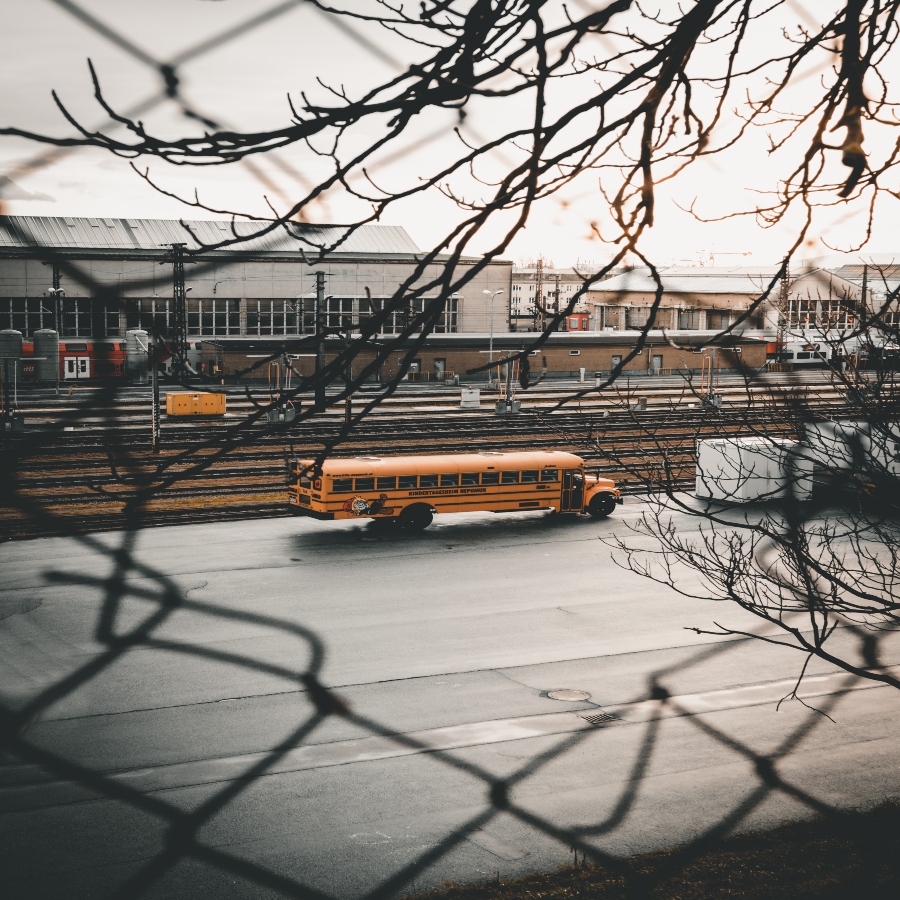On the school bus you should have seen them, monkeying around about wheels, bottles of non-alcoholic beers, Rock-Paper-Scissor, two kids having a shootout with six-piece revolvers, percussive wet claps from fingers squished between armpits, cheers, and are-we-there-yets. It really takes a special kind of person with the patience of a rock to be here, to wait, to listen, to be responsible for this kind of madness. And that’s just what the teacher and chaperone Mr. Tucker was doing, clutching his clipboard, the cork-color of the board blending with the brown hue of his hands. He called out names, checked them alphabetically. He breathed full, as if saying some mantra in his head, his heavy chest rising, like a mountain, in and out again. For a bus full of sixth graders is a visceral thing that gets in your skin, and even Mr. Tucker knew he couldn’t wash it out.
But if you don’t remember what it was like, these moments on a school bus, try to use your senses, try to remember how the unguarded sweat smells like a mildew or the ever-present release of gas, some silent and some just deadly. Recite the sounds of an orchestra of do re mi belches. Hear the language, to not only describe childhood, but to decipher it: spaz, dork, dweeb, loser, nerd—the tongues after Babel. And if you remember that, reach your hand under a seat and touch the collection of gum wads. Remember the pang of being struck in the head by a swinging seat belt buckle. Listen close to those kids who always sat in the back, how much fun they seemed to be having, how they jammed four-packed in three-seaters. Visualize the faces they made at passing drivers—how long their tongues could snake, how far back their eyes could roll, how their naked skin pressed like a squeegee to the glass.
As if a wave of fans at a stadium, a series of –ohs followed when one kid, the biggest kid, flipped his middle finger at someone driving behind them. And this kid was the one who hurt people; the same kid who pinched and bit other kids in elementary school, and how now he was notorious for squeezing arms and twisting them until the skin ached and reddened, and also known because his clothes smelled, and his parents were always late to pick-up; but if you told him that, he’d use his pubescent body to bruise you. Sure, he was bigger than most; and yet, in his own way, he was the smallest. That’s what you have to remember, if anything. He punched the kid next to him after he saw the driver in the car behind them yell something and speed up: then he told the kid not to say nothing.
The driver waved them down, Mr. Tucker braced for the sudden stop, and then the driver was hammering on the bus door. Mr. Tucker stood, a tall figure that almost touched the exit hatch, and from the tight three-button school-issued polo, the veins in his neck bulged, the frustration coursing through his body, and he turned and faced the children. How all the muscles in his torso tensed, how they could see each striation clearly, how they knew he was changing into something, how they swore he was a monster, and he climbed from seat to seat, gripping that upholstery, leaving the outline of his angry fingers—fingers searching for the culprit. From his belly, a deep growl like thunder, “Who did it,” and it wasn’t a question. The kids in the front pointed to the back. The kids in the middle pointed to the back. The kids in the back knew Mr. Tucker was there before he arrived; they felt the thud of his boots; they sensed the inhalations of a beast, they smelled the coffee on his breath, and it was on top of them. Most of the kids in the back kept their heads down, and one, still rubbing his arm and wincing, pointed to the kid next to him.
***
The biggest kid with the middle finger was moved to the front of the bus next to Mr. Tucker. The rest of the drive to the field trip, no one said anything loud enough to be heard outside their three-person seaters. All the other kids who were alone in two-seaters, didn’t feel all too bad for him, the boy next to Mr. Tucker. Some of those kids’ arms were still red and on fire. They smiled, and since they sat alone, no one noticed. When they arrived at the Constitution Center, the entire day, Mr. Tucker and the kid walked together. Some said they saw Mr. Tucker and him eat lunch together, that Mr. Tucker split his sandwich and gave the kid the other half, and that they talked a while on a bench separate from the group. They say they saw Mr. Tucker laugh, an octave of his voice they never heard before, high and like a hyena, and how he slapped his knee so hard it sounded like he broke it. The kid next to him finally looked small, but also seemed desperate to stay in the moment; he stared at Mr. Tucker as if he had found something that he had lost long ago. He stared and held his eyes there because he knew it wouldn’t last.
When they arrived back at school after dark, the kid’s mother wasn’t there to pick him up. Mr. Tucker tried to call, but she didn’t answer. So they sat outside the school, their shadows eclipsing the floodlights, a larger body, a smaller body, and they played games of Rock-Paper Scissors.
Originally published in Pithead Chapel.

